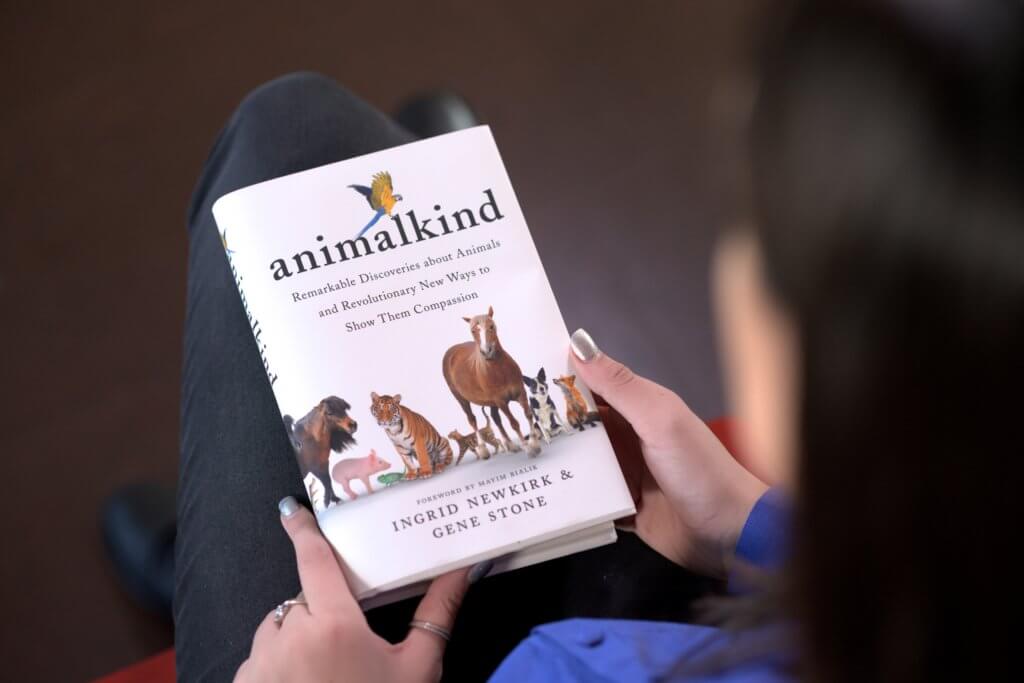

How will trailblazing PETA founder Ingrid Newkirk celebrate her 76th birthday? By helping animals, of course! You can join her activism for animals with these 76 quick, easy actions that can make a huge difference for animals caged in laboratories, confined for meat, seen as shoes and coats, or forced to carry tourists in the heat.
Here are 76 simple ways you can help animals for Ingrid’s birthday and beyond.
Animals Used in Experiments
Right now, millions of animals—including mice, rats, rabbits, monkeys, cats, and dogs—are locked inside barren cages in laboratories. What can you do to help stop this? Don’t support companies that test on animals. Check out PETA’s Cruelty-Free Database to make sure the household and beauty products you buy are truly cruelty-free. If a company you like isn’t on the list, urge it to partner with us. Donate to help PETA scientists advance animal-free test methods around the globe. Most importantly, contact your legislators to support PETA’s Research Modernization Now, which outlines a concrete plan to replace cruel, archaic tests on animals with state-of-the-art, human-relevant non-animal methods. Learn more about the failures of animal testing by watching our docuseries, The Failed Experiment, and sharing it with five other people.

Animals Used for Food
The meat, egg, dairy, and fishing industries slaughter billions of animals every year. Farms tear baby cows away from their mothers, cram birds by the thousands into filthy sheds, and subject animals to painful mutilations, such as tail-docking and beak-cutting. Pledge to go vegan, encourage five people to join you in PETA’s 3-Week Vegan Challenge, and order a free vegan starter kit for your friends (leave additional copies at the gym and grocery stores). Prepare a vegan dinner for your nonvegan friends and family, patronize a local vegan restaurant, and ask your favorite nonvegan eatery to expand its vegan options.
Animals Used for Clothing
Leather, wool, cashmere, down, and other animal-derived materials are all products of extreme cruelty. Workers remove cows’ sensitive horns without painkillers for leather, violently shear sheep for wool, pull fistfuls of feathers out of birds for down, and forcibly tear out goats’ hair for cashmere. Pledge to keep cruelty out of your closet by not wearing any animal-derived materials, and check out our guide to vegan fashion for tips on how to dress with compassion. If you have fur in your closet, donate it to PETA so that it can go to unhoused people or others in need. To help us continue our work to prevent animals from being used for clothing, buy someone a gift from the PETA Shop.

Animals Used for Entertainment
At roadside zoos, marine parks, bear cub-petting operations, and other tourist traps, animals often languish in tiny enclosures, enduring constant confinement so that humans can gawk at them. Many animals pace in their enclosures or swim in endless circles in tanks out of apparent distress. Never visit SeaWorld or any other establishment that exploits animals for profit and tell everyone to do the same. Be aware of sham rescues or seedy roadside zoos that pose as “sanctuaries” and share PETA’s tips on how to tell the difference between a real sanctuary and a fake one. Pledge never to engage in photo ops or other direct-contact interactions with wild animals, and travel with compassion by never patronizing activities that exploit animals.

Companion Animals
In the U.S. alone, millions of homeless cats and dogs struggle to survive on the streets. Meanwhile, many dogs are condemned 24/7 to backyards, where they can suffer from dehydration and hypothermia. You can help companion cats and dogs by promoting spaying and neutering in your community and pledging to always adopt animals, not shop for them. Educate others about the true costs of buying “purebred” dogs and how many of them—including pugs, French bulldogs, and other flat-faced breeds—endure long-term, debilitating, and painful health problems. If someone you know is still interested in getting a “purebred” dog, let them know that there are many of these dogs at shelters. Tell your neighbors why it’s wrong to chain dogs, and advocate for an anti-chaining ordinance in your community. To help PETA’s fieldworkers deliver vital, lifesaving shelter to companion dogs in underserved communities, consider sponsoring a doghouse.

Wildlife
Pledge to protect wildlife—from gentle rodents who make their way into your home to sensitive deer hunted for “sport.” Help end all sales of glue traps, which are among the cruelest methods of killing animals. Share tips for humane rodent control with your neighbors, and tell your landlord to use only humane rodent traps. Educate others about the cruelty of hunting, and encourage your legislators to enact or enforce wildlife-protection laws.

Animals Used for Dissection
Schools should foster a compassionate learning environment—not force students to cut open animals for dissection. If you’re a student or a parent, talk to your school board about why animal dissection is cruel and request alternatives at your school. Help TeachKind—PETA’s humane education division—continue its work to help schools bring animal-friendly curriculum into the classroom.

Other Ways You Can Help
Get inspired to push back against speciesism by reading Ingrid’s book Animalkind: Remarkable Discoveries About Animals and Revolutionary New Ways to Show Them Compassion and finding five interesting quotes to share with others. Donate to PETA’s Global Compassion Fund to help animals around the world. Help us expose cruelty to animals everywhere by sharing five of our investigations on social media. And join our Action Team to continue advocating for animals.


15 Rapid Actions
To complete 15 actions for Ingrid’s 76th birthday, fill out the form below. As soon as you complete an action, another one will appear in its place. After you enter your information, keep clicking until you’ve finished all 15 of them.